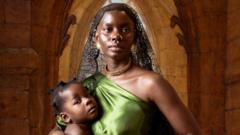---
As a multifaceted individual wearing the hats of a photographer, mother, and culturally rich Nigerian, Dola Posh faced a profound identity crisis after giving birth to her daughter in the midst of a pandemic. Just six days postpartum, Dola lay in a hospital bed in England, grappling with the enormity of her life changes. The isolation exacerbated by COVID-19 heightened her anxiety, as her family remained thousands of miles away in Lagos, Nigeria, leaving her feeling adrift. “I thought: ‘I’m me; the baby’s out, I’m still me.’ But no, I wasn’t me any more,” she reflected, unknowingly succumbing to postnatal depression—a condition that has disproportionately affected black women.
Surrounded by unsolicited parenting advice soon after leaving the hospital, Dola’s sense of control quickly eroded. “It made me feel like I didn’t know what I was doing,” she admitted about the pressure to conform. These thoughts spiraled into a deep, darker space. Stuck in an unending cycle of sleeplessness, isolation, and monotonous daily life, a desperate thought crossed her mind one night—a harrowing whisper encouraging her to end her life.
However, a pivotal call to her health visitor changed everything. With a cold grip of shame, she sought help that night, igniting the beginning of her transformation. Dola was encouraged to channel her emotions through photography, leading her to turn the lens on herself and document her struggles. With her daughter Monioluwa, meaning “I have God” in Yoruba, by her side, she created a poignant series of self-portraits that mirrored the classic Madonna and child imagery, though this connection was largely subconscious at first.
Dola’s upbringing in a devout family steeped in Christian iconography imbued her work with cultural depth. The colors and imagery woven into her childhood observations became infused in her creative process, leading to touching, meditative portraits that explore the complexities of motherhood. Empowered by her work, Dola began to articulate her journey, erasing the stigma that often silences discussions regarding mental health.
Dola aims to inspire and uplift black mothers experiencing similar struggles, leveraging her newfound voice and artistic platform. Winning a Leica award for her portfolio validated her message and her resolve to underscore the need for greater openness surrounding postnatal depression. “I want a world where black mothers don’t have to carry so much burden,” she emphasized, advocating for representation in media to reflect the realities of their experiences.
“We must normalize the conversations—accept all parts of our journeys. I want to stand and say: ‘I almost ended my life, I’m not ashamed of it—I am still an artist.’” In sharing her enlightenment and vulnerabilities, Dola Posh endeavors to weave a new narrative, one where joy exists alongside struggles, and mental health conversations flourish.
As a multifaceted individual wearing the hats of a photographer, mother, and culturally rich Nigerian, Dola Posh faced a profound identity crisis after giving birth to her daughter in the midst of a pandemic. Just six days postpartum, Dola lay in a hospital bed in England, grappling with the enormity of her life changes. The isolation exacerbated by COVID-19 heightened her anxiety, as her family remained thousands of miles away in Lagos, Nigeria, leaving her feeling adrift. “I thought: ‘I’m me; the baby’s out, I’m still me.’ But no, I wasn’t me any more,” she reflected, unknowingly succumbing to postnatal depression—a condition that has disproportionately affected black women.
Surrounded by unsolicited parenting advice soon after leaving the hospital, Dola’s sense of control quickly eroded. “It made me feel like I didn’t know what I was doing,” she admitted about the pressure to conform. These thoughts spiraled into a deep, darker space. Stuck in an unending cycle of sleeplessness, isolation, and monotonous daily life, a desperate thought crossed her mind one night—a harrowing whisper encouraging her to end her life.
However, a pivotal call to her health visitor changed everything. With a cold grip of shame, she sought help that night, igniting the beginning of her transformation. Dola was encouraged to channel her emotions through photography, leading her to turn the lens on herself and document her struggles. With her daughter Monioluwa, meaning “I have God” in Yoruba, by her side, she created a poignant series of self-portraits that mirrored the classic Madonna and child imagery, though this connection was largely subconscious at first.
Dola’s upbringing in a devout family steeped in Christian iconography imbued her work with cultural depth. The colors and imagery woven into her childhood observations became infused in her creative process, leading to touching, meditative portraits that explore the complexities of motherhood. Empowered by her work, Dola began to articulate her journey, erasing the stigma that often silences discussions regarding mental health.
Dola aims to inspire and uplift black mothers experiencing similar struggles, leveraging her newfound voice and artistic platform. Winning a Leica award for her portfolio validated her message and her resolve to underscore the need for greater openness surrounding postnatal depression. “I want a world where black mothers don’t have to carry so much burden,” she emphasized, advocating for representation in media to reflect the realities of their experiences.
“We must normalize the conversations—accept all parts of our journeys. I want to stand and say: ‘I almost ended my life, I’m not ashamed of it—I am still an artist.’” In sharing her enlightenment and vulnerabilities, Dola Posh endeavors to weave a new narrative, one where joy exists alongside struggles, and mental health conversations flourish.




















